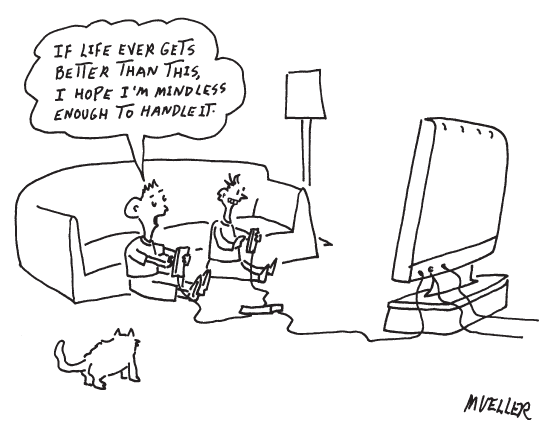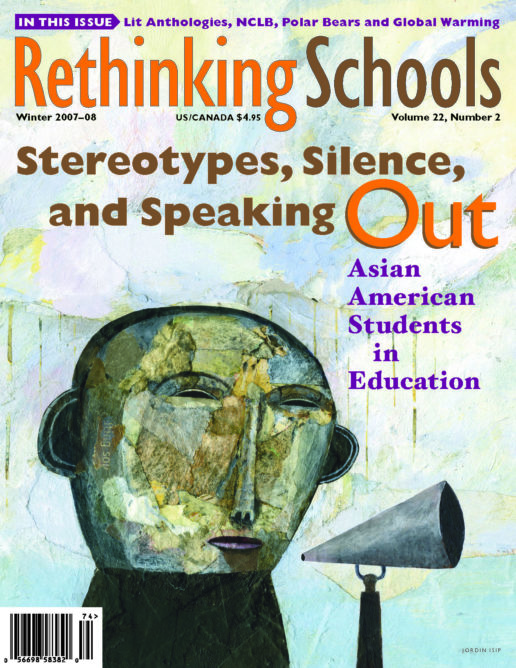Letters To The Editors 22.2

War, Peace, and TV
While Gregory Sotir’s article, “NCLB and the Military,” [Vol. 21, No. 4] addresses the issue of military recruitment in high schools, I must call attention to the dramatic effect of television recruitment.
I teach 4th grade in a school that serves a population that is almost entirely Latino English language learners, in a poor community. The words “I like to plant plants” were some of the first I heard from Agustino at the beginning of this year. He is shy and has a passion for doing what is right and good. I have attempted to cradle my students in a world of hope through our study of peace heroes. Therefore, I was shocked when he turned in an essay explaining what he wants to be when he grows up. After admitting that he knows it is a terrible thing, he said that it his duty to go to Iraq. He wrote, “The TV says that I must go defend my family, so rather than become a teacher or an astronaut, when I grow up I must go fight in the war.”
How could I explain to a 9-year-old that if he fought in this war, he could be forced to murder other human beings, and if he died it would not be in defense of his family but rather in defense of private interests? Agustino is like so many children whose experiences are deeply embedded in the sensationalized world that television creates. It is a world where military advertising, filled with melodrama and superficial heroism, finds a receptive audience.
The tragedy is clear. After a year with this individual, I have seen how he is driven to do the right thing. His goodness has been manipulated and exploited; media tools and circumstance outmatch my power as a teacher.
What chance does he have against such a relentless conspiracy? I don’t want Agustino to end up fighting in Iraq, where my cousin was sent three weeks ago, on his 18th birthday.
Natalie Coots
Watsonville, Calif.
Taking Risks
Heidi Tolentino’s article, “Race: Some Teachable-and Uncomfortable-Moments” [Vol. 22, No. 1] beautifully illustrates the difficulty many teachers and classes have in dealing with all the issues that surface in a class discussion, especially a discussion about race. These difficulties, in my view, arise whether one’s class is 75 percent European-American or 75 percent African-American. In my 30 years teaching American literature and history in an urban school (in the San Francisco bay area), where blacks outnumber whites, these “unpredictable and uncomfortable” moments are all too familiar. I commend Tolentino for facing the discomfort head on. Too often teachers bend to either intimidation or unwillingness to have these discussions.
While I do not agree with Tolentino’s approach completely (I believe text should be read as it is written), I admire her for realizing how important talk is in a classroom and how necessary any discussion of race is, given the current socio-economic climate. What makes this article even more significant is that it underscores the value of unplanned teachable moments. No amount of carefully worded teacher instructions or inservice pep talks from highly paid “experts” can prepare an innovative teacher for a question like, “I want to know what it felt like?” And responses like, “You can’t know.”
The article and Tolentino’s experience reminds us, too, that there are many ways our students learn in the classroom. Teaching is not seamless. The risks we take, the mistakes we make, and the opportunities we create are often jagged and painful but in the end always worthwhile.
Bruce Greene
Portland, Ore.
Citizen Students
In the fall issue of Rethinking Schools, you welcome response from teachers who are trying to teach critically about current world issues. I have been a teacher for the past thirty years. Throughout that time, whether I was teaching 8th-grade English, 6th-grade geography, or high school Algebra II, I have tried to simultaneously teach world citizenship. Here’s one story from my experience.
I was the upper-grade lead teacher at Sonoma Charter School. Every week, I set aside time to discuss world issues. Students were encouraged to raise questions, share concerns, and present information they’d gathered. At one of these meetings, an 8th grader asked me, “Did the U.S. soldiers at Abu Ghraib break the protocol set by the Geneva Convention?” Another student, Christopher, followed this with, “What’s he talking about? What’s the Geneva Convention?”
I gave a few minutes to explaining the history of the Geneva Convention, pulling out and sharing an encyclopedia article about it in the process, to be sure I was getting all my facts right. The more I talked, the more stunned Chris looked. Finally, he said, “But Madelyn, if they can make rules about how to have wars, why don’t they just make a rule not to have any?”
Eighth graders can see that this should be one of the most important possibilities on the table. Why is that so hard for the rest of us?
Madelyn Hodges
Sonoma, Calif.
Send letters or comments to:
jsokolower@earthlink.net or mail to:
Fred McKissack
Rethinking Schools
1001 East Keefe Avenue
Milwaukee, WI 53212

